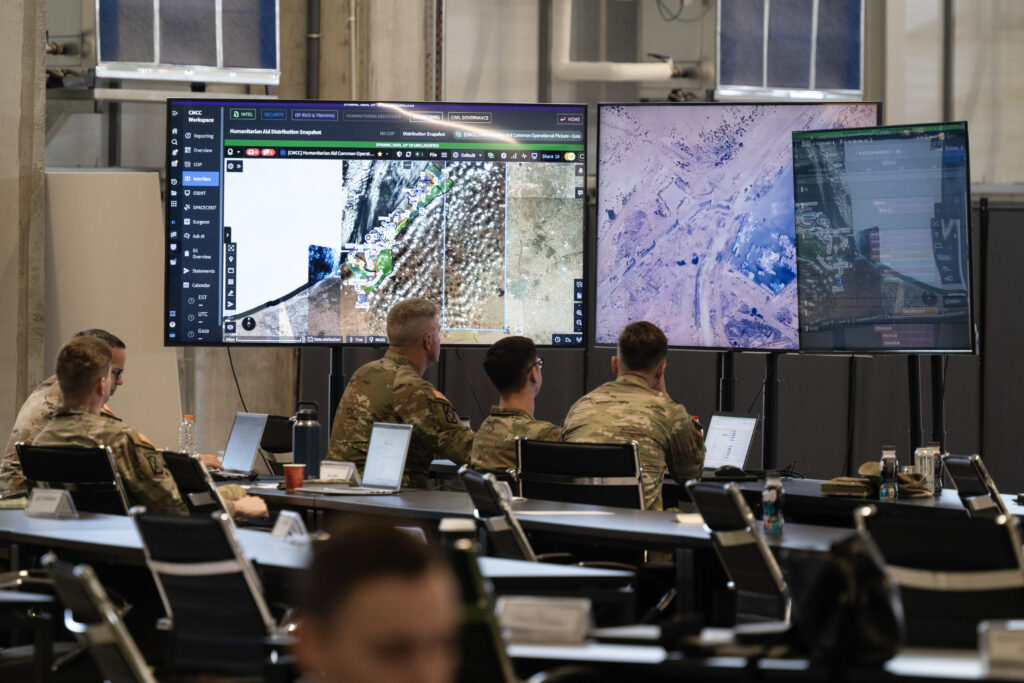AFP Asia Business
Much talk, little action at Gaza truce coordination centre
Launched after the Israel-Hamas ceasefire to monitor the truce and facilitate the flow of humanitarian aid, the Civil-Military Coordination Center for Gaza is struggling to live up to its promises.The CMCC, a US initiative, is meant to set the stage for the next steps of President Donald Trump’s peace plan for the Palestinian territory following more than two years of devastating war.”At first nobody knew what it was but everyone wanted in,” one European diplomat told AFP.”Now people are a bit disillusioned, because we feel like nothing is moving, but we have no choice… it’s either that or speaking with Israelis informally,” the diplomat added.”There are times when you think we’ve hit rock bottom, but we keep digging,” quipped a humanitarian source who has been to the centre several times to discuss shelters for the hundreds of thousands of Gazans displaced by Israel’s military campaign.The CMCC — based in a large warehouse in the southern Israeli city of Kiryat Gat — was presented to stakeholders such as NGOs, UN agencies and diplomats, as a generator of novel ideas for post-war Gaza. “When we opened it, we made clear that it’s focused really on two things. One is facilitating the flow of humanitarian, logistical and security assistance into Gaza. And two, helping monitor in real time, implementation of the ceasefire agreement,” Captain Tim Hawkins, a spokesman for the US Central Command (CENTCOM), told AFP.Frustrated by challenges with the Israeli authorities, many countries and humanitarian actors said they threw themselves into the project, eager to gain a new conversation partner that claimed to be inclined to find solutions: the United States.- ‘Nothing has changed’ -Two months after the CMCC’S launch, many humanitarians contacted by AFP said they felt the US capacity — or willingness — to pressure Israel is limited.”At the beginning, the Americans told us they were discovering that Israel was banning a whole range of items from entering Gaza — the notorious dual-use list. They seemed shocked, and we thought we’d finally get past that obstacle,” said one humanitarian engineer. “But the fact is that absolutely nothing has changed.”Those visiting the site described to AFP a large hangar where numerous, mainly American and Israeli, military personnel meet with humanitarians, diplomats and consultants.The first floor is for Israeli staff and the third is for US troops. Both are out of bounds to visitors.The second, lined with astroturf, is a meet and greet open space where diplomats and UN agency personnel meet.”It feels like a co-working space, but with people in uniform”, one diplomat said, noting that GIs sip on beers. Others saw a whiteboard scrawled with the question “What is Hamas?””There are roundtables on everything, from water and food distribution to security,” said a humanitarian source.But “this isn’t where decisions are actually made”, one diplomat said, citing parallel discussion channels, including a team supervised by Aryeh Lightstone, an associate of US Middle East envoy Steve Witkoff, in Tel Aviv.- ‘Lost compass of law’ -Several diplomats and humanitarian sources lamented the absence of Palestinian voices and the fact that they were generally consulted for their field expertise, but not for their opinion on the best route forward.Another issue lies in the emergence of concepts largely rejected by the international community, notably the creation of Alternative Safe Communities (ASC) in Gaza.The idea would see “vetted” non-Hamas affiliated Gazans grouped into communities built from scratch with basic services in Gaza’s “green zone” under Israel’s military control.”We have lost the moral compass of the law,” one diplomat said.”There is a very clear tension between the idea that one might be allowed to do almost anything — that creativity is required — and the nature of international humanitarian law itself, which is deliberately fixed and immutable.”The most frequent criticism is that political questions such as who should rule Gaza and who should be in charge of its security are left out, and debates are steered towards practical questions of how.”They’re looking at where to put the wastewater treatment plants. They are not looking at who is going to operate the wastewater treatment plants and who is paying the guys who are operating the wastewater treatment plants,” a diplomat said.Ultimately, several humanitarian and diplomatic sources lamented that the CMCC was absorbing their time for few results.CENTCOM’s Captain Hawkins acknowledged some “frictions and challenges” without elaborating, but highlighted successes such as the opening of more crossings for aid into Gaza.”We are making progress,” he told AFP, “while fully recognising that there is more work ahead.”

